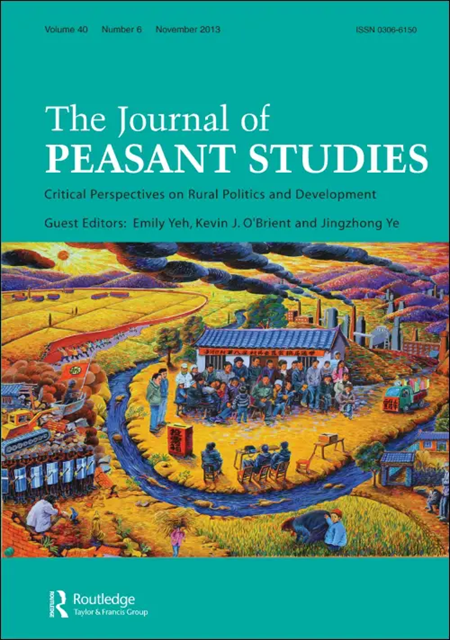Farmer-herder relations, land governance and the national conflict in Mali
IF 4.8
1区 社会学
Q1 ANTHROPOLOGY
引用次数: 0
Abstract
ABSTRACTFarmer-herder conflicts have been long standing in Mali’s rural areas. It has been shown that it is mostly herders who support and join jihadist groups. By analysing land regimes in farmer-herder contexts and merging studies on different scales of violence, the paper investigates how local dynamics interact with national political violence. It argues that historical precedents and pastoralist grievances related to land governance have created a fertile breeding ground for jihadism to take root and spread. It also contends that local land-related issues can have a considerable impact on state fragility and the eruption and dynamics of violence.KEYWORDS: Pastoralismdecentralisationland governanceconflictstate fragilityinstitutional multiplicityjihadism AcknowledgementI would like to express my sincere gratitude to Professor James Putzel for his invaluable guidance and support throughout my studies in international development at the LSE and during the course of this research. His profound expertise, insightful feedback, and patient mentorship have been crucial in shaping the direction and quality of this paper.Disclosure statementNo potential conflict of interest was reported by the author(s).Notes1 Institutions are the humanly designed constraints that shape human interaction in a society (North Citation1990; Knight Citation1992).2 This was for instance the case in indirect colonial rule, which was described as decentralised despotism by Mamdani (Citation1996, Chapter 3).3 Other indicators of state fragility include the failure of the state to: exercise a monopoly over the legitimate use of force, which is the key defining characteristic, but also to develop basic bureaucratic capacity and to exercise territorial control (idem).4 For instance, the definition of the OECD does not differentiate general conditions of underdevelopment from conditions of fragility (Putzel Citation2010, 2).5 Islamic State in West Africa Province.6 Literal translation: local land management.7 During colonialism, the imposition of new borders for administrative purposes led to the unprecedented articulation of identities along ethnic lines (Hesseling and van Dijk Citation2005).8 The main terrorist groups active in Mali include ISIS in the Greater Sahara (ISIS-GS) and the Al Qaeda-affiliated Jama’at Nusrat al-Islam wal-Muslimin (JNIM). JNIM is an umbrella group including Al-Qaeda in the Islamic Maghreb (AQIM), Ansar al-Dine and Katiba Macina among others (Nsaibia Citation2020a).9 The deployment of Dogon militias is extremely problematic, as Dogons have historically opposed Fulanis in farmer-herder conflicts (Benjaminsen and Ba Citation2021).10 Putzel and Di John (Citation2012) argue that understanding the incentive structure and organisational dynamics of armed groups is essential to defeat them or bring them into peace processes, rather than solely analysing their motivations.Additional informationNotes on contributorsEva HansenEva Hansen is a professional in the field of international development. She holds a BSc in Anthropology from University College London (UCL) and an MSc in Development Studies from the London School of Economics and Political Science (LSE). Through these degrees and her professional experience, she developed her interest in the anthropology of conflict and in analysing expressions of political violence from multiscalar perspectives. Eva currently works for the Overseas Development Institute (ODI) in the Global Risks and Resilience team.马里的农牧民关系、土地治理和民族冲突
摘要农牧民冲突在马里农村地区长期存在。事实证明,支持和加入圣战组织的大多是牧民。通过分析农牧民背景下的土地制度,并结合不同暴力规模的研究,本文研究了地方动态与国家政治暴力的相互作用。报告认为,历史先例和牧民对土地治理的不满为圣战主义的扎根和传播创造了肥沃的土壤。它还认为,与土地有关的地方问题可能对国家的脆弱性以及暴力的爆发和动态产生相当大的影响。我想对詹姆斯·普策尔教授表示衷心的感谢,他在我在伦敦政治经济学院学习国际发展的整个过程中,以及在我的研究过程中,给予了我宝贵的指导和支持。他深厚的专业知识、富有洞察力的反馈和耐心的指导在塑造本文的方向和质量方面起着至关重要的作用。披露声明作者未报告潜在的利益冲突。注1制度是人为设计的约束,它塑造了社会中的人际互动(North citation, 1990;骑士Citation1992)。2例如,间接殖民统治就是这种情况,Mamdani将其描述为分散的专制主义(Citation1996, Chapter 3)国家脆弱性的其他指标包括:国家未能对合法使用武力行使垄断,这是关键的决定性特征,但也未能发展基本的官僚能力和行使领土控制(见)例如,经合组织的定义并没有区分不发达的一般情况和脆弱的情况(Putzel Citation2010, 2)伊斯兰国在西非省。6直译:地方土地管理在殖民主义期间,为了行政目的而强加的新边界导致了沿着种族线的前所未有的身份表达(Hesseling和van Dijk Citation2005)活跃在马里的主要恐怖组织包括大撒哈拉地区的伊斯兰国(ISIS- gs)和基地组织附属的伊斯兰胜利阵线(JNIM)。JNIM是一个伞形组织,包括伊斯兰马格里布基地组织(AQIM)、伊斯兰后卫组织(Ansar al-Dine)和圣战组织(Katiba Macina)等多贡民兵的部署是非常有问题的,因为多贡人历来在农牧民冲突中反对富拉尼人(Benjaminsen和Ba Citation2021)Putzel和Di John (Citation2012)认为,了解武装团体的激励结构和组织动态对于击败他们或将他们带入和平进程至关重要,而不仅仅是分析他们的动机。作者简介:eva Hansen是国际发展领域的专业人士。她拥有伦敦大学学院(UCL)人类学学士学位和伦敦政治经济学院(LSE)发展研究硕士学位。通过这些学位和她的专业经验,她对冲突人类学和从多尺度角度分析政治暴力的表达产生了兴趣。伊娃目前在海外发展研究所(ODI)的全球风险和韧性团队工作。
本文章由计算机程序翻译,如有差异,请以英文原文为准。
求助全文
约1分钟内获得全文
求助全文
来源期刊

Journal of Peasant Studies
Multiple-
CiteScore
10.50
自引率
17.60%
发文量
99
期刊介绍:
A leading journal in the field of rural politics and development, The Journal of Peasant Studies (JPS) provokes and promotes critical thinking about social structures, institutions, actors and processes of change in and in relation to the rural world. It fosters inquiry into how agrarian power relations between classes and other social groups are created, understood, contested and transformed. JPS pays special attention to questions of ‘agency’ of marginalized groups in agrarian societies, particularly their autonomy and capacity to interpret – and change – their conditions.
 求助内容:
求助内容: 应助结果提醒方式:
应助结果提醒方式:


